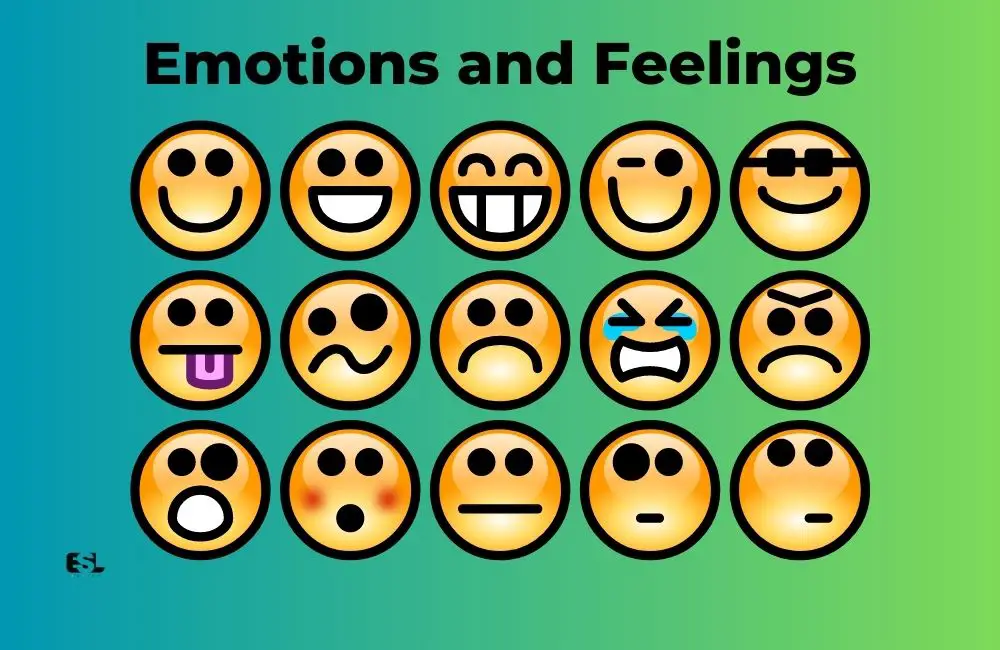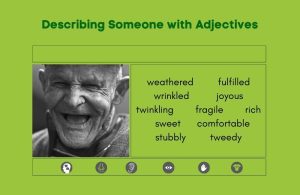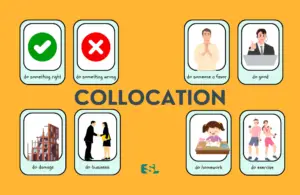Describing our inner states or feelings can often be challenging, primarily due to emotions’ subjective and intangible nature. However, having a rich vocabulary to express these experiences can be empowering, helping us communicate more effectively and empathize with others.
In this article, we’ll explore a wide array of words and phrases that describe various emotional states, grouped into several categories.
Table of Contents
- 1. Words Describing Happiness
- 2. Words Describing Sadness
- 3. Words Describing Anger
- 4. Words Describing Fear
- 5. Words Describing Love
- Sample Conversation: Using Vocabulary Related to Emotions and Feelings
- Conclusion
- FAQ: Vocabulary Related to Emotions and Feelings
1. Words Describing Happiness
We start with a fundamental human emotion: happiness. Here are some words that can be used to express various shades and intensities of happiness.
| Word/Phrase | Meaning/Usage | Example Sentences |
|---|---|---|
| Elated | Feeling or expressing great happiness or triumph | “She was elated at the news of her promotion.” |
| Ecstatic | Feeling or expressing overwhelming happiness or joyful excitement | “He was ecstatic when he found out he won the lottery.” |
| Content | A state of peaceful happiness or satisfaction | “He felt content after a good meal.” |
| Jubilant | Feeling or expressing great joy and triumph | “The team was jubilant after the victory.” |
| Gleeful | Exuberantly or triumphantly joyful | “The children were gleeful on Christmas morning.” |
| Exultant | Triumphantly happy | “She was exultant after passing her exams.” |
| Radiant | Clearly emanating great joy, love, or health | “The bride looked radiant on her wedding day.” |
| Blissful | Extremely happy; full of joy | “They had a blissful day at the beach.” |
| Thrilled | Extremely pleased or excited | “He was thrilled to receive an acceptance letter from his first-choice university.” |
| Serene | Calm, peaceful, and untroubled | “She felt serene while meditating.” |
| Overjoyed | Extremely happy and delighted | “He was overjoyed when his best friend surprised him on his birthday.” |
If you are searching for an effective English language vocabulary builder, try Word Power Made Easy: The Complete Handbook for Building a Superior Vocabulary (Amazon Link). This time-tested classic has helped millions achieve mastery of English and improve their communication skills in business, the classroom, and in life.
2. Words Describing Sadness
Sadness is another universal human emotion. The following words offer various ways to express different levels and types of sadness.
| Word/Phrase | Meaning/Usage | Example Sentences |
|---|---|---|
| Despondent | In low spirits from loss of hope or courage | “He felt despondent after losing his job.” |
| Forlorn | Pitifully sad and abandoned or lonely | “She looked forlorn after her puppy ran away.” |
| Morose | Sullen and ill-tempered | “He became morose after his team lost the game.” |
| Melancholic | Feeling or expressing pensive sadness, often with no obvious cause | “She was feeling melancholic after watching the sunset.” |
| Grief-stricken | Intensely sorrowful due to a loss | “He was grief-stricken when his mother passed away.” |
| Heartbroken | Overwhelmed by profound sorrow, especially due to a breakup in a relationship | “She was heartbroken when her boyfriend ended the relationship.” |
| Dismal | Depressingly gloomy or bleak | “The dismal weather matched his mood.” |
| Miserable | Wretchedly unhappy or uncomfortable | “He was miserable when he was sick with the flu.” |
| Crestfallen | Sad and disappointed | “She was crestfallen when she didn’t get the job she wanted.” |
| Woeful | Characterized by or expressing sorrow or misery | “Her woeful expression revealed her disappointment.” |
| Desolate | Feeling or showing great unhappiness or loneliness | “He felt desolate when he moved to a new city alone.” |
3. Words Describing Anger
Anger is a powerful emotion that ranges from mild irritation to intense rage. Here are words to describe varying degrees of anger.
| Word/Phrase | Meaning/Usage | Example Sentences |
|---|---|---|
| Livid | Extremely angry | “He was livid when he found out he was cheated on.” |
| Furious | Extremely angry | “She was furious when her work was criticized unfairly.” |
| Irate | Feeling or characterized by great anger | “The irate customer demanded a refund.” |
| Fuming | Showing great anger | “He was fuming after his car was towed.” |
| Seething | Filled with or characterized by intense but unexpressed anger | “She was seething after being belittled by her colleague.” |
| Vexed | Annoyed, frustrated, or worried | “He was vexed by the constant interruptions.” |
| Infuriated | Extremely angry and impatient | “She was infuriated when her privacy was violated.” |
| Riled | Make someone annoyed or irritated | “His arrogant attitude really riled her.” |
| Aggravated | Made more serious by attendant circumstances | “His tardiness aggravated her.” |
| Outraged | Arousing fierce anger, shock, or indignation | “The community was outraged by the unjust decision.” |
| Enraged | Very angry; furious | “The unfair treatment enraged him.” |
4. Words Describing Fear
Fear can be described in many ways, from a mild sense of unease to paralyzing terror. Here are some words to describe fear.
| Word/Phrase | Meaning/Usage | Example Sentences |
|---|---|---|
| Terrified | Extremely frightened | “She was terrified during the thunderstorm.” |
| Alarmed | Worried or frightened by something | “He was alarmed by the sudden noise.” |
| Petrified | So frightened that one is unable to move | “She was petrified when she saw the snake.” |
| Spooked | Frightened, scared, or startled | “The sudden shadow spooked him.” |
| Panicked | Feel or cause to feel panic | “He panicked when he realized he was late for his meeting.” |
| Fearful | Feeling afraid; showing fear or anxiety | “She was fearful of the dark.” |
| Apprehensive | Anxious or fearful that something bad will happen | “He was apprehensive about the medical test results.” |
| Horrified | Filled with horror; shocked greatly | “She was horrified by the accident scene.” |
| Frightened | Afraid or anxious | “The child was frightened by the loud noise.” |
| Dismayed | Cause someone to feel consternation and distress | “She was dismayed by the rude comment.” |
| Scared | Fearful; frightened | “He was scared of spiders.” |
5. Words Describing Love
Finally, let’s look at words that describe the warm, positive feeling of love and affection.
| Word/Phrase | Meaning/Usage | Example Sentences |
|---|---|---|
| Affectionate | Showing, indicating, or characterized by affection or love | “She gave her daughter an affectionate hug.” |
| Fond | Having an affection or liking for | “He is very fond of his grandmother.” |
| Enamored | Be filled with a feeling of love for | “She is enamored with her new puppy.” |
| Infatuated | Be inspired with an intense but short-lived passion or admiration for | “He was infatuated with the new girl in class.” |
| Adoring | Showing great love and admiration | “He looked at her with adoring eyes.” |
| Devoted | Very loving or loyal | “She is a devoted mother.” |
| Passionate | Having, showing, or caused by strong feelings or beliefs | “They are passionate about each other.” |
| Doting | Extremely and uncritically fond of someone; adoring | “Her doting parents always spoiled her.” |
| Besotted | Strongly infatuated | “He is absolutely besotted with his wife.” |
| Lovesick | In love, or missing the person one loves, so much that one is unable to act normally | “The lovesick teenager could not concentrate on his studies.” |
| Cherishing | Protect and care for (someone) lovingly | “She cherished her husband dearly.” |
To elevate your vocabulary in just 30 days, I recommend to my students an informative, fun, and accessible guide to utilizing powerful language. Millions of individuals have enhanced their academics, job skills, and confidence by dedicating just fifteen minutes daily to the exercises and tests of 30 Days to a More Powerful Vocabulary (Amazon Link), a top-selling. It offers step-by-step methods to bolster language prowess, discover compelling words, and daily vocabulary enhancement with pronunciation guidance.
Sample Conversation: Using Vocabulary Related to Emotions and Feelings
Situation: At a quaint park, Mia and Leo are reflecting on a movie they recently watched, discussing the range of emotions it evoked.
Mia: Hey Leo, weren’t you deeply “moved” by that film? The main character’s “despair” and subsequent “resilience” were so palpable.
Leo: Absolutely, Mia. It stirred a mix of “empathy” and “admiration” within me. Especially during those scenes depicting her “anguish” and “loneliness”.
Mia: Right? And the film beautifully juxtaposed moments of sheer “joy” and “elation” with those of “sorrow” and “grief”.
Leo: The “nuances” in emotions were depicted so well. It was a rollercoaster, from “apathy” to “passion”, from feeling “despondent” to “ecstatic”.
Mia: It’s incredible how stories have the power to evoke such “introspection”. It made me “reflect” on my own “emotional spectrum”.
Leo: Same here. Art truly has a unique way of resonating with our “innermost feelings” and making us confront our own “vulnerabilities”.
Conclusion
By expanding your emotional vocabulary, you can more accurately express your feelings and empathize with others. Not only does this foster better communication, but it also aids in self-understanding and emotional intelligence.
Whether you’re ecstatic or despondent, there’s a term to describe your inner state. Continue to explore and use these words to enrich your emotional expression and communication.
FAQ: Vocabulary Related to Emotions and Feelings
1. What does it mean to be “moved” by something?
To be “moved” by something means to be emotionally affected or touched, often resulting in feelings of sympathy or empathy.
2. How does “despair” differ from general sadness?
“Despair” refers to a complete loss of hope, often accompanied by profound sadness, while general sadness can be temporary and triggered by less intense circumstances.
3. Why is “empathy” considered crucial in human interactions?
“Empathy” allows individuals to understand and share the feelings of others, fostering connection, support, and mutual understanding.
4. What constitutes feelings of “anguish”?
“Anguish” is intense suffering, distress, or pain, often emotional in nature, stemming from adversity or tragedy.
5. How does “joy” manifest in a person?
“Joy” is a feeling of great pleasure and happiness, often visibly manifesting through laughter, a lightness in demeanor, or a positive outlook.
6. What is the significance of “nuances” in emotions?
“Nuances” in emotions refer to the subtle differences or variations in feelings, which can provide a deeper understanding of one’s emotional state.
7. How does “apathy” affect a person’s behavior?
“Apathy” is a lack of interest, enthusiasm, or concern, often resulting in indifference or inaction towards events or activities.
8. Can someone feel both “despondent” and “ecstatic” at the same time?
While “despondent” and “ecstatic” are opposing emotions, a person can experience a rapid shift between the two, especially in emotionally charged situations.
9. What role does “introspection” play in understanding emotions?
“Introspection” involves examining one’s own thoughts and feelings, helping in self-awareness and a deeper understanding of one’s emotional responses.
10. Why is acknowledging our “vulnerabilities” considered strength?
Acknowledging “vulnerabilities” allows for personal growth, self-acceptance, and fosters genuine connections with others, showcasing authenticity and courage.






